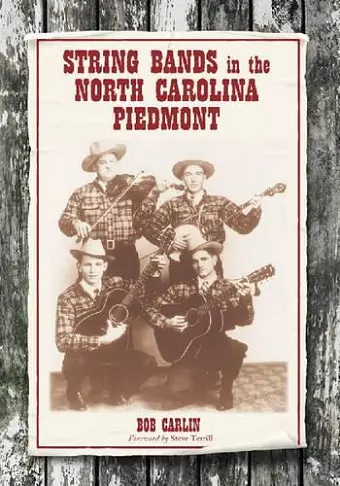String Bands in the North Carolina Piedmont
Format:Paperback
Publisher:McFarland & Co Inc
Published:31st Jul '04
Currently unavailable, and unfortunately no date known when it will be back

String band music is most commonly associated with the mountains of North Carolina and other rural areas of the Blue Ridge and Appalachian mountains, but it was just as abundant in Piedmont region of North Carolina, albeit with different influences and stylistic conventions. This work focuses exclusively on Piedmont string band music with regard to the history and culture of the area and the music's development and the changes within traditional communities of the Piedmont. It begins with a discussion of the settlement of the Piedmont in the mid-1700s and early references to secular folk music, including the attitudes the various ethnic and religious groups had on music and dance, the introduction of the fiddle and the banjo, and outside influences such as minstrel shows, Hawaiian music and classical banjo. It then goes on to cover African-Americans and string band music; the societal functions of square dances held at private homes and community centers; the ways in which musicians learned to play the music and bought their instruments; fiddler's conventions and their history as community fundraisers; the recording industry and Piedmont musicians who cut recordings, including Ernest Thompson and the North Carolina Cooper Boys; Bascom Lamar Lunsford and the Carolina Folk Festival; the influence of live radio stations, including WPTF in Raleigh, WGWR in Asheboro, WSJS in Winston-Salem, WBIG in Greensboro and WBT in Charlotte; the first generation of locally-bred country entertainers, including Charlie Monroe's Kentucky Partners, Gurney Thomas and Glenn Thompson; and bluegrass and musical change following World War II.
“a detailed history...rich, complex narrative...fascinating stories...most helpful...highly recommended”—Choice; “a must-read. A definitive work on its subject...will have you tapping your toes from first page to last”—Our State; “excellent...well-written...a welcome addition to the growing body of literature on North Carolina’s musical heritage...deserves a place on the shelf”—The North Carolina Historical Review;”a valuable introduction to Joe Sweeney’s life and career as well as an overview of minstrelsy and the banjo during their developmental years. Scholars and casual readers alike will find something of interest in this work, especially in the discussions of America’s early nineteenth-century musical activities. Carlin successfully rescues Joe Sweeney from obscurity and demonstrates the important role he played in making the banjo one of the most ubiquitous parts of American musical culture”—Winterthur Portfolio; “he seems to leave no stone unturned, enlightening the reader as to a musician’s first instrument, how he/she procured it, how that person learned to play and where it all led Interesting insight in provided...well researched and documented...fans will enjoy this richly descriptive look at ordinary people who contributed extraordinarily to America’s musical heritage. Recommended”—Sing Out! “Carlin has left no note unsung...exhaustive research”—Greensboro News and Record; “extensively researched and liberally illustrated”—Courier-Tribune.com; “a quick enjoyable read...peppered with verbatim accounts from many of the musicians and their surviving family members”—The Dispatch, (Lexington, N.C.); “a book that should be eagerly welcomed by serious students of country-music history...attractive and meticulous...thorough researcher, Carlin writes very well”—Dirty Linen.
ISBN: 9780786418268
Dimensions: unknown
Weight: 499g
275 pages